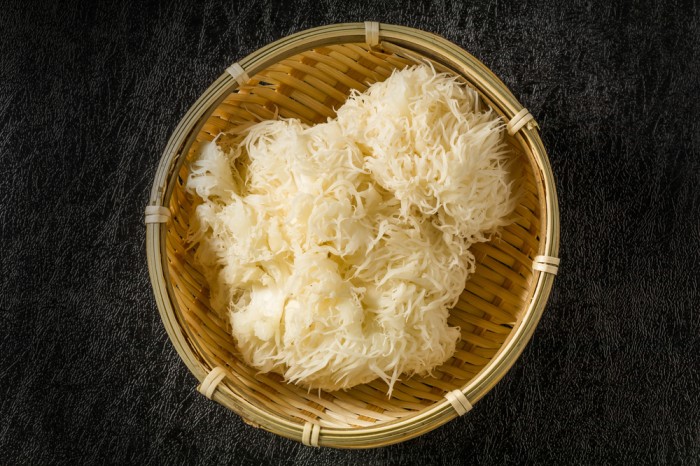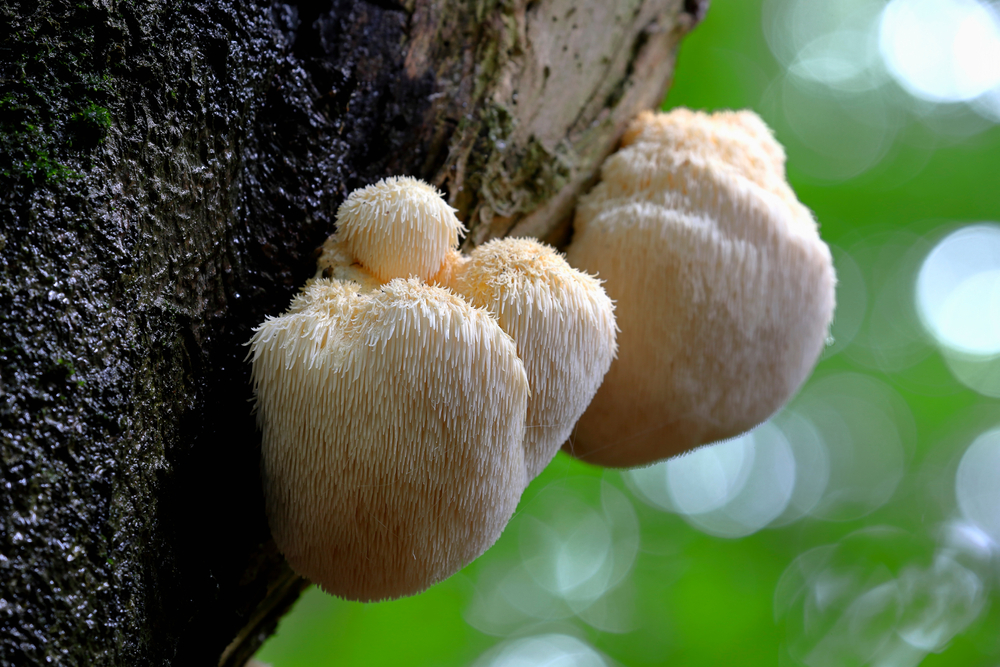Visually stunning with a flavor profile reminiscent of lobster, lion’s mane mushrooms are already a favorite in the culinary world. At the same time, the health benefits of this functional fungi — long appreciated in Eastern medicine — are also gaining a reputation in the West. Mycologist Paul Stamets (of “Fantastic Fungi” fame) has described mushrooms as “nature’s miniature pharmaceutical factories” and lion’s mane mushrooms are no exception. These pale, shaggy-looking fruit bodies are notable for their ability to boost cognitive functions like memory and concentration, reports the New York Times.
Saprophytic success story
First identified in North America, the lion’s mane mushroom (Hericium erinaceus in Latin, with “hericium” meaning “hedgehog”) can be found in Europe and Asia. In Asia, where they’re most prevalent, the mushroom also goes by the names hou tou gu or yamabushitake.
The fungi’s preferred spot to fruit is on dead wood — hardwood beech especially — meaning that the lion’s mane is a saprophytic or wood-recycling species, getting its nutrients from decaying matter. This preference for dead wood means that the mushroom can easily be grown both at home by hobbyists and commercially. This furry-seeming fungi does well on a growing platform of sawdust substrates when cultivated commercially, often puffing up to the size of a football.

In the wild, fruiting bodies typically appear in late summer and can keep up production until November because of their hardiness in the face of frost.
Lion’s mane mushrooms are recognized by their spiny white strands, living up to their reputation by resembling the mane of the big cat they’re named for. They lack the distinctive cap other mushrooms typically have and are white in color when fresh but gradually darken to an earthy yellow hue as they age. Their spines grow in rows and can be anywhere from 10 to 40 mm long, drooping down towards the ground in the wild, as the fungi sprouts from the side of a tree’s trunk.
Lion’s mane mushrooms are the brain mushroom
Lion’s mane mushroom benefits are numerous. They are considered adaptogens, which means they have beneficial effects on multiple bodily systems, and can help increase overall resistance to stress. In China, the fungi has traditionally been used to treat gastric ailments but more recently lion’s mane is being touted for its ability to improve cognitive functioning in both healthy and ailing brains. In 2009, a Japanese study enlisted adults aged 50 to 80 with mild cognitive impairment and found that a daily dose of three grams of lion’s mane in powdered form had a significant positive effect on brain function — one that ceased to exist when the supplement was removed from their diet.
The hypothesis behind this brain-boosting benefit is that lion’s mane features two compounds, hericenones and erinacines, that have been shown to stimulate brain cell growth. A 2020 Malaysian study found that the mushroom showed promise in the prevention of degenerative brain disease like Alzheimer’s and dementia. For those with healthy brains, the goal of adding lion’s mane to your diet is a increase in mental clarity, improved memory, and enhanced concentration — as well as those aforementioned preventative medicinal benefits.

The anti-inflammatory properties of lion’s mane are also being studied with promising results in the mental health arena. In mice, administration of hericium erinaceum showed a reduction in a specific type of depression linked to inflammation.
There are also potential benefits for those trying to better manage and control diabetes and further studies linking the benefits of adding lion’s mane to your diet are being done in the areas of heart health, gastro-intestinal wellness, nervous system injury recovery and immunity strengthening.
Taking it all in
Lion’s mane mushrooms can be eaten raw or cooked and are second only to shiitake in terms of their popularity on the food scene. “It has a mild taste and is fantastic sautéed in butter,” Lauren Haynes, the founder of Wooden Spoon Herbs, told the New York Times. The flavor is often favorably compared to that of sweet-tasting shellfish like lobster and crab.
Lion’s mane extracts and lion’s mane supplements are also becoming more prevalent in health and wellness markets. Consumers can choose from powders that can be added to smoothies or a cup of coffee, dried lion’s mane mushrooms that can be steeped in tea, or lion’s mane extracts, currently available in everything from energy bars to sauces and seasonings. There’s no shortage of ways to add this health-boosting ingredient to your diet — and no excuse not to.

